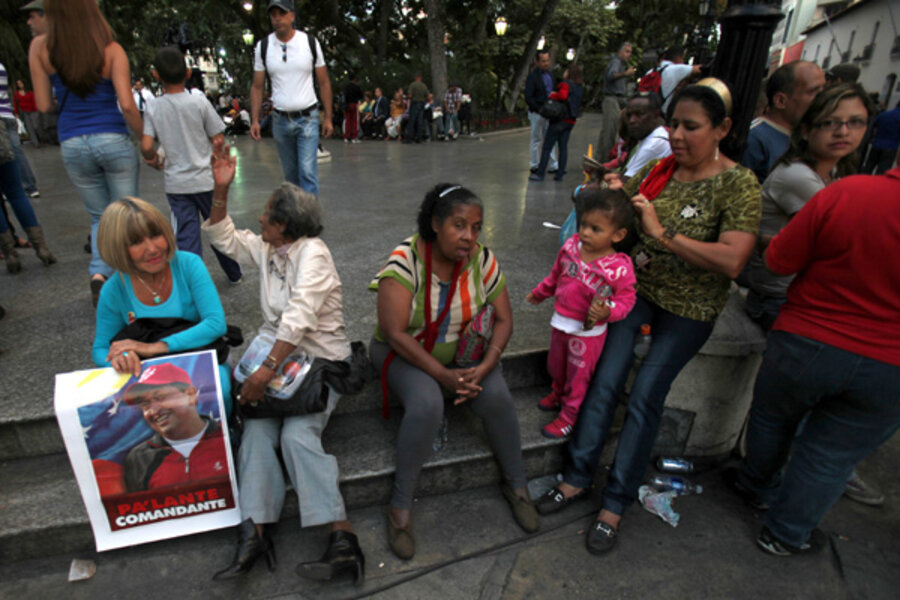Got sugar? Venezuela faces shortages of staple foods
Loading...
| Caracas, Venezuela
While President Hugo Chávez convalesces in Cuba following his fourth cancer operation, Venezuelans face a struggle of a different kind in the midst of shortages of basic food products.
Consumers are having to scour markets for staples such as sugar, milk, chicken, and harina pan, a corn flour used to make arepas – corncakes that predominate the Venezuelan diet.
"We're replacing one product with another," says Rosa Garcia, a real estate agent who was on a three-day hunt for meat across various Caracas neighborhoods. "First there was no beef, now no chicken. Last night I made eggs for my family's dinner."
Grocery shopping in Venezuela is rarely an easy task, with consumers often forced to deal with long lines and sporadic shortages at their local markets. But the increased difficulty in finding basic consumer goods in recent weeks is raising concerns about the viability of Mr. Chávez's socialist economic policies at a time when the country is already on edge due to his prolonged absence and the uncertainty of Venezuela's political future. Chávez has not been seen or heard from since early December.
Political woes may now be accentuating economic problems, explains Ronald Balza, an economics professor at both the Central University of Venezuela and Andrés Bello Catholic University. "People are making 'nervous purchases,'" buying up what they can in the midst of political instability, fearing the possibility of a devaluation, Mr. Balza says.
"It's the government," says Maria González, a homemaker who blames the administration for a lack of cooking oil and sugar at her middle class supermarket in eastern Caracas.
Economists say local businesses are struggling to satisfy levels of consumption that went up during last year's election season when the Chávez administration boosted imports of all kinds in an effort to woo the voting public. Conindustria, a confederation of private Venezuelan industries, estimates that in 2012 the country broke spending records with as much as $54 billion spent on foreign goods.
"Consumption has increased faster than production and the availability of foreign currency is insufficient to cover imports," says Balza.
Blame game?
Since the October presidential election, foreign currency, which is regulated by the government at an official rate and made available to businesses through government-administered exchange markets, has become increasingly scarce. Foreign currency, namely US dollars, is paramount to providing basic food products in the country as internal production has fallen due to price controls and the availability of cheap imports during an oil bonanza. This, coupled with Chávez's nationalization of more than 1,000 businesses and properties during his tenure, has deterred domestic production.
Critics of the Chávez administration say the dollar crisis is further complicating an already rigid climate for businesses, with the greatest fallout coming in the food sector. The Central Bank of Venezuela released its monthly scarcity index on Friday, comprised of a sampling of goods from markets across the country, indicating that in December shortages reached their highest levels in four years.
However, the Chávez government, which has a long history of applying price controls on many consumer staples in what it says is an effort to curb inflation, blames business for the shortages. It has now launched a nationwide crackdown on "hoarders and speculators" whom it believes are manipulating the market for windfall profits.
"The radical and irresponsible right wants to keep the population in a constant state of anxiety and therefore they’ve launched a new campaign of shortages," said Food Minister Carlos Osorio.
On Saturday, government officials announced they would expropriate a Pepsi franchise in Vargas state after finding 8.5 tons of unused sugar in a warehouse. The multinational said this is the amount of sugar needed for 13 days of production.
Analysts warn, however, that while using up company inventories may temporarily refill store shelves across the county, in the long run such practices are unsustainable.
The 'how' and 'when'
According to José Luis Saboin, a senior economist at the Caracas think-tank Econanalitica, unpopular economic adjustments to rectify Venezuela's dollar squeeze have been delayed as President Chávez is still confined to a hospital bed and is so far unable to assume power for his fourth term in office.
Devaluing the currency, raising taxes, and cutting public spending are among the measures that the government could implement to further stretch petro-dollars. Yet such decisions are unlikely to be taken in the short run given the looming possibility of another presidential election should Chávez not recover.
"No one knows when or how the government is going to make adjustments, because no one knows if the president is ever going to return," says Mr. Saboin.







